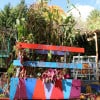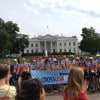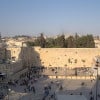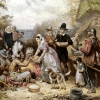by Becky Adelberg, JCC Chicago Parashat Re’eh Editor’s Note: Welcome to D’varim HaMakom: The JOFEE Fellows Blog! This is our inaugural post. Most weeks throughout the year, you’ll be hearing from the JOFEE Fellows: reflections on their experiences, successful programs they’ve planned and implemented, gleanings from the field, and connections to the weekly Torah portion and what they’ve learned from their experiences with place in their host communities for the year. Be sure to check back weekly! PS Interested in being or hosting a JOFEE Fellow? Applications for cohort two are now open for both prospective fellows and prospective host institutions! And now, on to Becky’s post … I’m thrilled for this opportunity to write about one of my favorite events of the year: Shabbat on the Lake. To me, Shabbat on the Lake is more than an event. It is a mindset, a movement, a gathering of all corners of the Jewish community; it’s a tapestry of various affiliations, ways of engaging with Judaism and the possibility of a Jewish community who focuses on things that unite us as opposed to what divides us. Shabbat on the Lake’s inception at JCC Chicago arose six years ago to show young Jewish adults various […]
Topic: Reflections
Shmita, like Shechina, Goes Global: Reflections from a Hammock on This Shmita Year
By Amichai Lau-Lavie A year ago I was laying in a hammock on a Brazilian beach, planning a year’s worth of Shmita study and action that will rebrand this ancient sustainability practice rooted in the Land of Israel for new digital generations all over the world. Hovering between earth and sky provided the perfect setting to what I was designing: An adaptation of the Shmita concept beyond its original halachic, geographical and agricultural settings so that it will prove useful and meaningful to so many more of us. Now that the year is almost up and FallowLab, the project I designed, is starting its descent, it’s time to get back into the hammock and reflect on lessons learned and theories tested. Many creative projects and conversations emerged this year with varying degrees of success at wrestling with Shmita and offering ambitious renditions and new traditions. What sticks for future? Did we live up to the values of Shmita, did this year live up to expectations? Luckily I don’t have to go back to Brazil to find a reflection-friendly hammock. When I got back home last summer I set up a shmita garden in my Manhattan backyard: Stripped the garden of […]

Because Sometimes it Rains on Your Sukkah
by Sarah Chandler Geshem Be’ito (Acceptance of Rain in Its Time) The following essay will be published in the forthcoming book of teachings “Good Noticing” published by the Institute for Jewish Spirituality. The rhythms of the Jewish calendar may not coincide with your particular climate. At times, our traditional rituals may range from the impractical to the impossible. For example, in the Northern Hemisphere, calling upon light in the darkness of Chanukah in Kislev/December always resonates, but singing about blossoming trees in Shevat/January may not make sense. How can we stay true to our tradition when the weather doesn’t cooperate? And as mindfulness practitioners, how might we elevate the news of undesirable weather? Those of us who live in the Northeastern United States are usually blessed with bountiful precipitation year-round. Furthermore, our religion is no longer based on the careful balance between following God’s laws and receiving in return enough rain for our crops to survive. The Reform movement even removed the second paragraph of the Shema from prayer books to make the bold statement: we are modern Jews—we do not believe that we can influence God to change the weather by keeping the commandments of our tradition. Recent evidence […]

Roseanne Barr Invokes Jewish Values to Change Lives
Roseanne Barr invoked Jewish values to change lives at an innovative, enlightened, and provocative Purim retreat at Isabella Freedman this past weekend. In the last decade of the 20th century, Roseanne Barr brought the issues and concerns of working class America to life through her groundbreaking sitcom “Roseanne.” This past weekend, it was Roseanne Barr once again bringing concepts to life, this time in such a powerful and profound way that it literally changed the lives of some of those in the room with her. Roseanne served as the leader for a gathering at the Isabella Freedman Jewish Retreat Center in Falls Village, Connecticut, for the Jewish holiday of Purim, one of many holidays celebrating a great story of redemption. The Isabella Freedman Jewish Retreat Center is a campus of the organization Hazon, a Jewish non-profit with the mission of creating a healthier and more sustainable world. One of Hazon’s current points of focus regards creating a renaissance around the Jewish concept of shmita, the sabbatical year described in the Torah and other Jewish texts, which is scheduled to begin on Rosh Hashanah of 2014. A rarely recognized tradition, particularly outside of Israel, the idea of shmita includes not only […]
An Exception to the Rule
by Shae Selix This piece originally appeared on the Arava Institue website. Through my Masa scholarship, I have had the privilege to work for the past three and a half months at the Arava Institute for Environmental Studies in Kibbutz Ketura. Like many Masa students, I have been able to see the beauty of Israel, from the acacia trees in the Negev, to the mystical waters in the Dead Sea, to the Jerusalem stone in the capital. I feel that my experience may be particularly unique because at the Arava Institute I have had the opportunity to experience how Jews and Arabs have the potential to not only live peacefully together in Israel, but also become great friends. Of course, due to the timing of my stay, I have also seen that this is not always the case. Only weeks ago, the State of Israel was in armed conflict with Gaza. At the Institute, we all had to watch together as Israel was again in the spotlight of the world stage, and hopes of peace in the Middle East seemed even further set back. For many new residents of Israel, this surely represented a first opportunity to witness the tragedy of […]
The Heebavore: Jewish Vegan Cooking in the New Year
By Rachel Grossman I’m the Heebavore – a Jewish/vegan food blogger, a born and raised secular Jew who, just under one year ago, converted to Judaism and became an aspiring vegan. My Jewish journey really began just a few years ago as I attended classes, met with rabbis, went to services with no frame of reference, repeatedly lost in Hebrew gibberish that made me long for something solid and sweet, guttural. To be one voice among many, to be of something greater, larger. And, of course, part of this was trying to make Jewish foods to internalize it all. At the time, it wasn’t clear to me that foods held any particularly special place in the journey. (more…)
Genesis and Human Stewardship of the Earth
Jewcology is a diverse platform for Jewish environmental activists to learn from each other in order to educate Jewish communities about our responsibility to protect the environment. Hazon is excited to share these resources with you! We provide and promote ways to relate Jewish learning and Jewish teaching to environmental action and sustainability efforts. By Rabbi Yonatan Neril[1] The first two chapters of Genesis contain teachings with profound relevance for ourselves and our world today. After creating Adam and Eve, G-d blesses them, saying “Be fruitful and multiply, fill the earth and subdue it, and have dominion over the fish of the sea, and over the birds of the sky, and over every living thing that moves upon the earth.”[2] What does it mean for humans to subdue the earth and have dominion over other creatures? One of the central precepts of Rabbinic Judaism is that the Written Torah must be understood within the context of the 2,300 year-old rabbinic tradition (including the Midrash and other works) that interprets it. While on the surface the words of this verse appear to give people license to degrade and subdue the earth, the Oral tradition makes clear that a wholly different message […]

3,600 Miles and 10 Weeks Later, the Hazon Cross-USA Ride Arrives in DC
Our 10 cross-country cyclists and 60 others who joined along the way raised over $120,000 in support of sustainable food systems from over 1200 donors.

Tisha B’Av: from Mourning to Celebration
Reflections on the period of the three Weeks, a period of mourning between the 17th of Tammuz and the 9th of Av.

The Farm Bill: Live in Action
Work to pass the next Farm Bill is happening now. Nigel Savage, Executive Director of Hazon, believes it is important for you to act.

Turkey Talk
I was not brought up with Thanksgiving. My first exposure to this very American holiday was when I was in Yeshiva in Jerusalem.

Crowning God King
By Rabbi Steve Greenberg, Hazon Board Member Originally posted on Siach: An Environment and Social Justice Conversation Every year, as the summer winds down I begin to look forward to the high holidays. While I surely enjoy the family and the food, for me it’s the chill in the morning air, the haunting music and the power of the liturgy that excite me. My partner and I seek out singing-communities on the high holidays. I can’t wait to be carried away by the once-a-year melodies and from the beginning of September they waft through my brain in anticipation. The music expresses ecstatic joy, longing and dread and this mix of emotions is reflected in the poetry of the liturgy. (more…)
Cosmic Consciousness, Man, and the Worm: Ecology and Spirituality in Jewish Tradition
By: Rabbi David Sears Ecology is a highly practical branch of science. Nothing could be more “down to earth” than preservation of the planet. Yet there is a facet of ecological awareness that is often overlooked. This is its spiritual dimension. When we act as self-absorbed individuals, with little regard for anyone or anything that exists outside ourselves, we immediately fall into moral and spiritual error. As the Yiddish saying goes, “A blind horse heads straight for the pit!” Thus, countless laws in the Torah adjure us to open our eyes, and act responsibly and compassionately toward the world around us. Among other ecological mandates, it promulgates the laws of bal tashchis (neither to destroy wantonly, nor waste resources unnecessarily); the prohibitions of cutting down fruit trees, or trees surrounding an enemy city in wartime; the laws of covering excrement, and removing debris from public places, etc. In doing so, the Torah indicates that although we may feel at odds with nature, having to struggle to survive, in truth the world comprises a potentially harmonious whole in which each element is precious. Rav Avraham Yitzhak Kook (1865-1935), Chief Ashkenazic Rabbi of pre-state Israel and a leading 20th century thinker, expresses […]
10 Years Ago in Postville, Iowa / Shabbat Hazon
14th July 2010 Dear All, Hazon is ten years old this year. We’re working hard in multiple ways to bring forth our vision – a healthier and more sustainable Jewish community, and a healthier and more sustainable world for all. We’re proud that our 45 Hazon CSAs (Community-Supported Agriculture programs) are now the largest faith-based system of CSAs in the country. This fall, as well as our 10th NY Ride and our 10th Israel Ride, we’re launching a new CSA Conference (at Isabella Freedman) and a Food Leadership Forum (at Walker Creek, in CA). We’re developing Makom Hadash, our shared-space for second-stage Jewish non-profits. We’re planning our second CA Ride – and a second Israel Food Tour, with the Heschel Center. Meantime, New York’s DOT is planning the protected bike lane in the Upper West Side that we organized for. The Alliance for Religions & Conservation is working on a Sacred Cities initiative that grew out of our Jewish delegation last year. And we’re proud of the extraordinary success of Wilderness Torah and Jewish Farm School, the two organizations that we’re fiscal sponsor to. JFS has established a new home at Eden Village Camp, one of the most remarkable new […]
An End and a Beginning
Dear Friend , I had a marvelous morning tromping in the snow in Central Park yesterday, marred only somewhat by the knowledge that at about the same time I was meant to have been on a flight to San Francisco. The snow giveth, and the snow taketh away… But it was a good morning to look back and look forwards. Chanukah has just ended; also the Copenhagen Climate Conference. We’re now 10 days from the end of the year and the end of the decade. Hazon began with the decade. Our first Ride was in the summer of 2000. Next year sees our 10th New York Jewish Environmental Bike Ride and our 10th Arava Institute Hazon Israel Ride, not to mention our sixth season of Hazon CSAs (now 40 of them, around the country). Two days from now more than 600 people will be at the largest event in our history, our fourth Hazon Food Conference. (more…)



